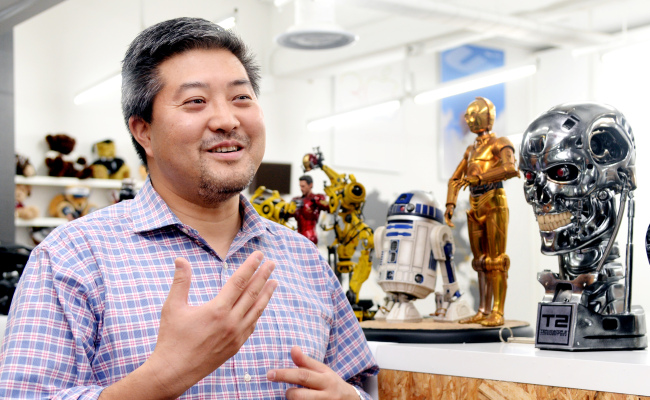Start-up Seoul is a new series featuring players in Korea’s emerging tech start-up scene. This is the fourth installment. ― Ed.
—
Korea’s modern start-ups are taking a marked turn from their predecessors. Instead of basking in local success, they are getting smarter and faster about going global, according to Korean-American venture capitalist Bernard Moon.
That is why he and two founding partners placed their bets on Seoul’s sprouting start-up scene in 2012, and set up SparkLabs, a Silicon Valley-style accelerator for young companies with global potential.
“The landscape has changed because one, you get more bilingual entrepreneurs, and two, they understand that they can’t just take a product and plop it into their second target market,” he told The Korea Herald during a recent trip to Seoul. “The next generation is really looking to go abroad.”
The emergence of Korea’s technology prowess is not sudden. From Nexon and Cyworld to microtransactions and online multiplayer games, Korea has been at the forefront of innovation since the ’90s, noted Moon, a serial entrepreneur and investor since then and a longtime fixture in the global start-up scene. He recalled that Silicon Valley’s top venture capitalists like Bill Gurley, a general partner at high-profile investment firm Benchmark, would visit Korea in the early 2000s to gauge the trends.
 |
| Bernard Moon, founding partner of SparkLab’s accelerator and global venture fund, poses at the firm’s Seoul office. (Park Hyun-koo/The Korea Herald) |
Moon, who returned to live in Seoul from 2000-2004 for his voice technology start-up HeyAnita, realized that what he saw back then as “an Asian thing” like microtransactions and camera phones were not actually just cultural quirks — they ended up catching on in the U.S. and globally, years after he moved to San Francisco.
“Things that I thought were cultural weren’t really cultural. It was the fact that technology was ubiquitous (in Seoul),” he said.
But in those years of strong growth, Korea’s tech industry failed to globalize, a problem even today’s big companies like Daum Kakao are struggling to cope with, he commented.
Nowadays, some local start-ups are going all-out to hit the U.S. market with SparkLabs’ alumni including big-data analyzer NFLabs, mobile game analytics firm 5Rocks and cosmetics delivery service Memebox leading the pack.
And they are braving fresh ground. Korea’s fruitful early tech ventures like Nexon, Hangame — now NHN — and Smilegate did not spread the wealth to a new generation of start-ups in the way that Google and Facebook fertilized Silicon Valley, he said.
Part of the problem was a lack of sharing culture within the companies, starting with the way the founders handled equity, Moon explained. While Silicon Valley companies would create a 20 percent stock option pool for employees, most of the wealth generated by Korean companies would be concentrated at the top.
If the wealth had been spread with a stock option pool, hundreds of those first-generation employees could have become today’s angel investors to replenish the start-up ecosystem, Moon said. The trend is changing with investors like Softbank forcing its start-ups to create stock options, but he is doubtful that the idea of sharing the wealth has completely set in among modern start-ups.
“Korea missed the boat with NHN and Nexon (for passing on the wealth). It was part cultural, but then, the mentality still fully isn’t there,” he said. “It’s very anti-Silicon Valley what still goes on in Korea.”
Because of that shortage of wealthy first-generation entrepreneurs, SparkLabs is seizing the opportunity to provide not just funding, but also much-wanted mentorship.
“This shared pain, shared misery but also knowledge or whatever learnings that we’ve had … that’s what they’re really starving for,” he said
SparkLabs has expanded its brand to a globally invested seed fund, which Moon cofounded in 2013, currently with over 50 projects across five continents. It is also pushing to launch a Beijing accelerator by year-end and an Internet of Things lab in Songdo, Incheon, further down the road. Applications for the Seoul accelerator’s fifth class, to run this fall, close July 31.
For more information, visit www.sparklabs.co.kr.
By Elaine Ramirez (elaine@heraldcorp.com)



